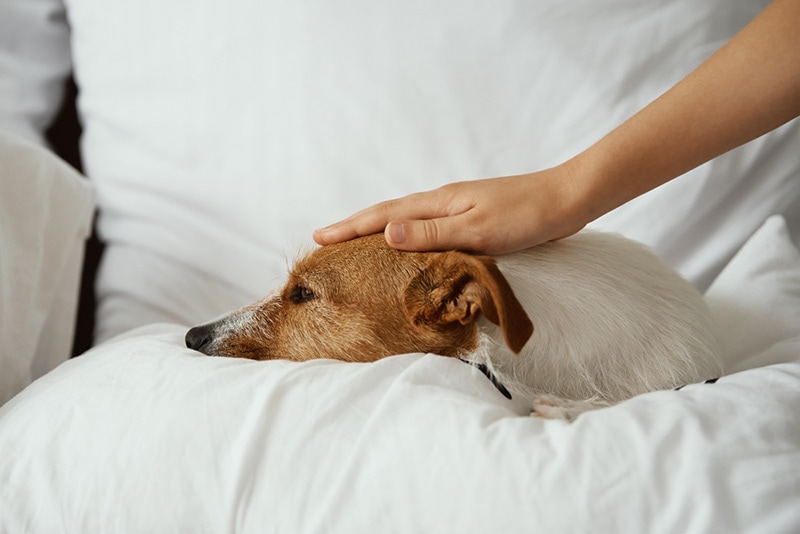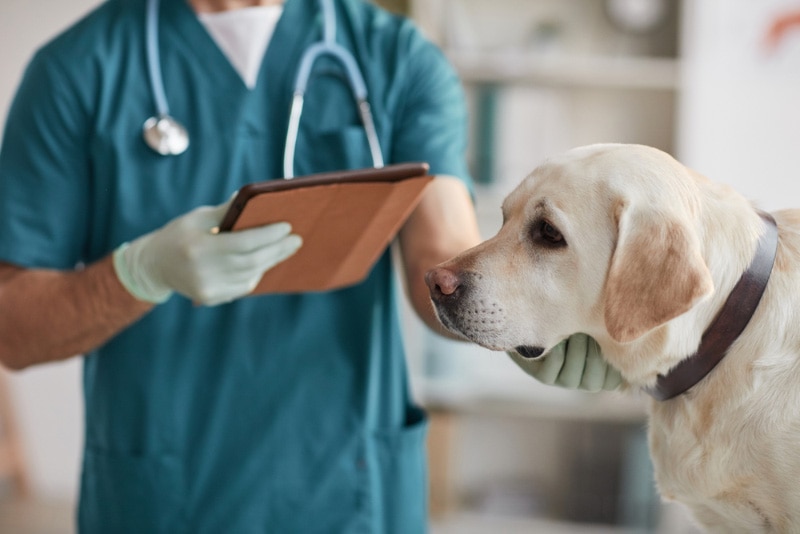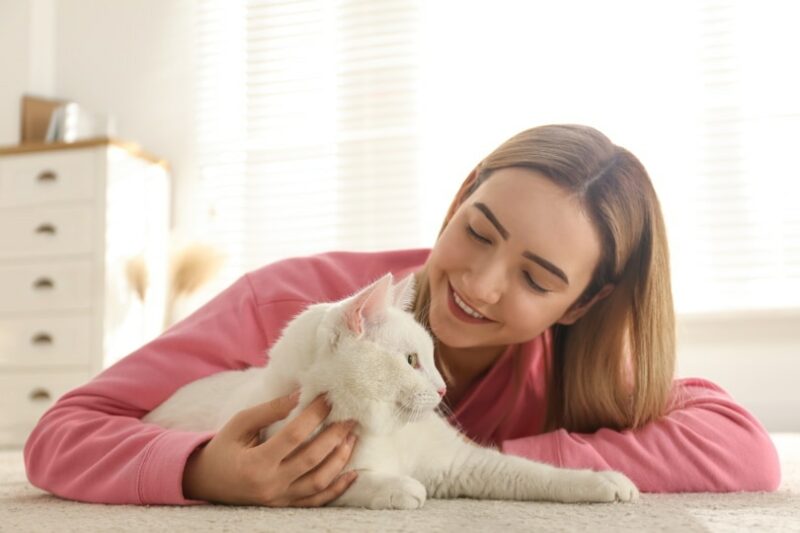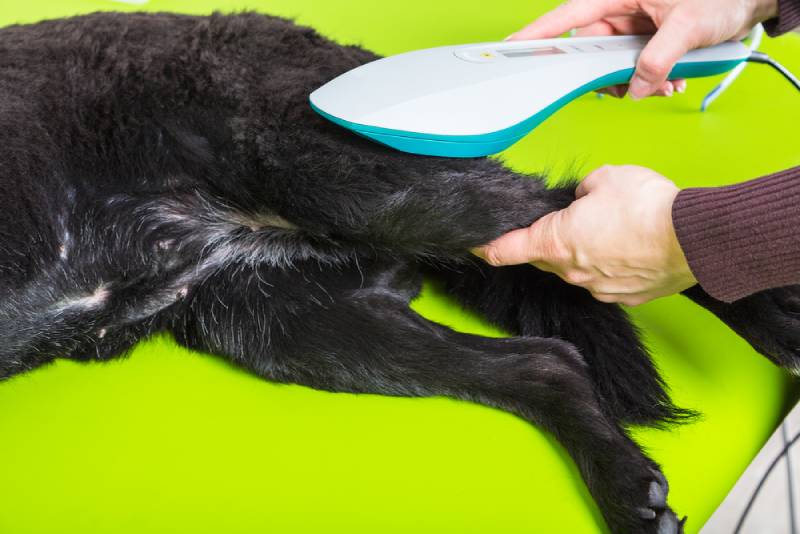My Dog Ate Grease: Here’s What to Do (Vet Answer)

Updated on

Click to Skip Ahead
Dogs like to scavenge—it is in their nature to seek out food and this often ends up with them eating things that they shouldn’t. Dogs gravitate towards fatty, rich foods containing lots of grease. Grease is one of the tastiest things a dog can find to scavenge and usually is made up of animal fats from pieces of meat. Grease is not necessarily toxic to dogs, but it can make your dog very sick. If your dog has gotten access to a large amount of grease, you should contact your local vet immediately.
Has your dog eaten some grease? Are you worried about how this will affect your dog? You have come to the right place. Read this vet-written guide to find out when you should be concerned and what to do in this situation.
What Types of Grease are Bad for Dogs?
Any type of grease can be harmful to dogs. Grease that dogs tend to be attracted to is from animals, this includes:
- Beef
- Bacon
- Lamb
- Chicken
- Turkey
- Pork
There are also grease products from non-animal sources, these include:
- Lard
- Margarine
- Butter
- Olive oil
- Rapeseed oil
- Palm oil

Is Eating Grease Bad for Dogs?
Grease is not toxic to dogs. It is made up of the fats of the meat that has been cooked. It is very high in fat and salt, and both of these in large quantities can irritate the lining of your dog's gastrointestinal tract. It can cause your dog considerable discomfort, and they can start vomiting and may have diarrhea too. They may also become bloated. Often the clinical signs are not too serious and will resolve on their own. In some cases, clinical signs can be very severe and cause multiple issues for your dog that require veterinary intervention.
Fatty foods such as grease and meat drippings can cause pancreatitis (inflammation of the pancreas) in dogs. Pancreatitis can be excruciatingly painful for dogs. The pancreas becomes inflamed and swells up, and digestive enzymes are activated prematurely and causing internal pancreatic digestion, more inflammation, and tissue damage. This affects organ function and can eventually become fatal. Some breeds are more prone to developing pancreatitis.
Depending on what the meat has been cooked with, there may be some toxic ingredients present such as onions or garlic. Some preservatives can cause adverse effects too.
Foods with a high salt content can be very dangerous for dogs. Too much salt in their diet can cause salt poisoning, or salt toxicosis which can be deadly. High-salt foods can cause or contribute to kidney failure. Foods with a high salt content can cause vomiting, diarrhea, and seizure activity in dogs.
Dogs require a certain amount of fat in their diet, but it is essential that it is the right type of fat and is fed in the correct amounts. It’s important to feed your dog a balanced diet, containing protein, carbohydrates, vitamins, minerals, and fiber as well in order for them to function properly.
My Dog Ate Grease, What Do I Do Now?
Follow our step-by-step guide if you have a dog that has eaten grease.
1. Prevent Your Dog from Eating Any More Grease
If your dog has stolen a pan or been licking a drip tray, take it away from them and prevent them from having any more access. If your dog will tolerate it, you can attempt to wipe their mouth to remove any grease that is still there coating the inside of their mouth.
Take your dog away from the source of the grease and keep them supervised. Clean up any spillages and make sure there isn't grease leaked anywhere your dog can lick it.
2. Contact Your Vet
Eating grease can be completely harmless for some dogs, but it can also cause serious health issues for others. Your vet will need to take a brief history from you over the phone to gain a good idea of the clinical picture they will be dealing with. Be prepared for them to ask questions such as:
- Roughly how much grease has your dog eaten?
- When did your dog eat the grease?
- Where was the grease from?
- How old was the grease?
- How did your dog access the grease?
- What size is your dog?
- What breed is your dog?
- How old is your dog?
- How much does your dog weigh?
- Is your dog showing any clinical signs of illness currently?
- Does your dog have any health issues?
- Is your dog currently on any medication?
- Has your dog ever ingested grease before?
Try to stay calm and give your vet as much information as possible.

3. Follow Your Vet's Instructions
Your vet is likely to want to see your dog. Make your way down to the hospital as soon as possible. Take a picture or bring a sample of the grease, or the packet it came from if possible.
4. Do Not Attempt to Treat Your Dog at Home
You may want to keep your dog at home and monitor them for any signs of illness or attempt to treat them at home by making them vomit. This is not recommended. Some dogs will have no ill effects after eating grease, whereas some will become extremely ill very quickly. There is no way of knowing how your dog is going to respond so it is always the safest option to contact your vet and follow their advice.
Home remedies for making dogs vomit are unreliable and often cause more damage than good so it is always best to leave it to the team at your vets.
5. Monitor Your Dog Closely
Your dog could start showing signs of illness very soon after ingestion of the grease. They may need assistance, so it is important to keep a close eye on them. Do not leave them on their own.

Clinical Signs Your Dog Has Eaten Grease
The clinical signs will vary depending on how much grease your dog has ingested and if there were any additional toxic components such as garlic or onions present.
Clinical signs include:
- Vomiting
- Diarrhea
- Nausea
- Hypersalivation
- Retching
- Lethargy
- Reduced or no appetite
- Drinking excessively
- Urinating more
- Swelling of abdomen
- Abdominal pain
- Blood in feces
What Will Your Vet Do?
Depending on the amount and type of grease your dog has eaten, and the signs they are showing, your vet may want to see your dog at the hospital to check them out. They will examine them and go over their clinical history with you. They will then determine if your dog is stable or needs emergency treatment and if they are low or high risk.
Your vet may need to admit your dog and give them intravenous fluids and pain relief. Attempts to make your dog vomit to decontaminate their digestive tract may be done depending on how much grease was consumed and whether it contained anything else. Your vet will need to do a routine blood test and potentially a specific test for pancreatitis. They will also assess your dog's urine.
X-rays and ultrasound scans may be required depending on the circumstances. Your dog will remain under veterinary care until they are well enough to go home.

How to Prevent Your Dog from Eating Grease
There are a few simple steps you can take in and around your home to prevent your dog from eating grease.
Make sure your bins are dog-proof. Bins are one of the most common places your dog will get access to grease. Dogs are naturally attracted to the smell of grease and often develop bad habits of rifling through trash cans as they know they will contain scraps of food.
Keep any cooking oil or butter out of your dog's reach. Do not leave them out on counters or anywhere your dog can jump up and snatch them. Dispose of grease straight away when you have finished cooking. Discourage your dog from eating scraps from the table or any human food in general so they don't develop bad habits of scavenging.
Ensure your dog has access to plenty of enrichment toys and activities and that they have enough mental stimulation each day to prevent them from becoming bored and trying to scavenge. Ensure they are getting walked enough too for the same reasons.
Conclusion
Grease is found in almost every kitchen and smells delicious to dogs. Given half a chance, most dogs will attempt to devour anything greasy they can get their paws on. While small amounts of grease are usually harmless, depending on the size of your dog and the amount of grease they have ingested, there can be serious health issues.
If your dog has eaten grease, it is important to contact your vet as soon as possible and follow their advice. It is always better to be safe than sorry.
Featured Image Credit: pedphoto36pm, Shutterstock














